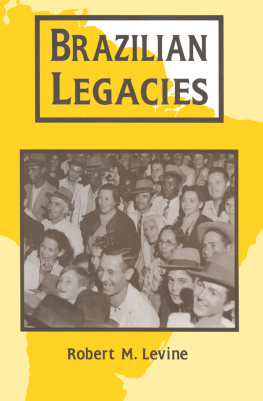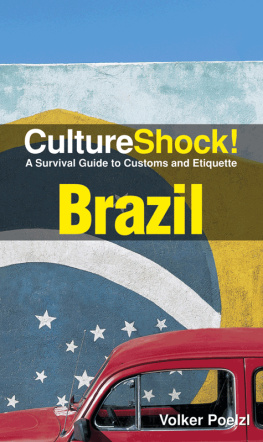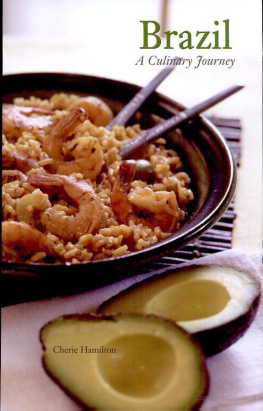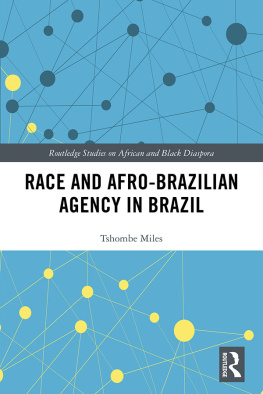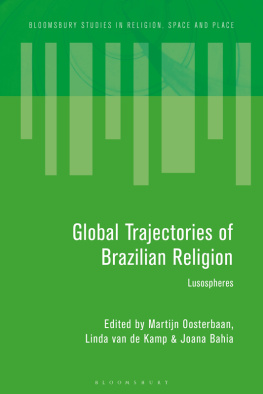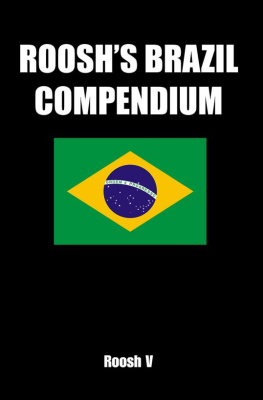Robert M. Levine - Brazilian Legacies
Here you can read online Robert M. Levine - Brazilian Legacies full text of the book (entire story) in english for free. Download pdf and epub, get meaning, cover and reviews about this ebook. year: 0, genre: Politics. Description of the work, (preface) as well as reviews are available. Best literature library LitArk.com created for fans of good reading and offers a wide selection of genres:
Romance novel
Science fiction
Adventure
Detective
Science
History
Home and family
Prose
Art
Politics
Computer
Non-fiction
Religion
Business
Children
Humor
Choose a favorite category and find really read worthwhile books. Enjoy immersion in the world of imagination, feel the emotions of the characters or learn something new for yourself, make an fascinating discovery.
- Book:Brazilian Legacies
- Author:
- Genre:
- Year:0
- Rating:3 / 5
- Favourites:Add to favourites
- Your mark:
- 60
- 1
- 2
- 3
- 4
- 5
Brazilian Legacies: summary, description and annotation
We offer to read an annotation, description, summary or preface (depends on what the author of the book "Brazilian Legacies" wrote himself). If you haven't found the necessary information about the book — write in the comments, we will try to find it.
Brazilian Legacies — read online for free the complete book (whole text) full work
Below is the text of the book, divided by pages. System saving the place of the last page read, allows you to conveniently read the book "Brazilian Legacies" online for free, without having to search again every time where you left off. Put a bookmark, and you can go to the page where you finished reading at any time.
Font size:
Interval:
Bookmark:

BRAZILIAN
LEGACIES
Perspectives on Latin America and the Caribbean
THE CHAINS OF INTERDEPENDENCE
U.S. POLICY TOWARD CENTRAL AMERICA, 19451954
Michael L. Krenn
A HOLY ALLIANCE?
THE CHURCH AND THE LEFT IN COSTA RICA, 19321948
Eugene D. Miller
QUISQUEYA LA BELLA
THE DOMINICAN REPUBLIC IN HISTORICAL AND CULTURAL PERSPECTIVE
Alan Cambeira
BRAZILIAN LEGACIES
Robert M. Levine
THE HAUNTING PAST
POLITICS, ECONOMICS AND RACE IN CARIBBEAN LIFE
Alvin O. Thompson
BRAZILIAN
LEGACIES
Robert M. Levine

First published 1997 by M.E. Sharpe
Published 2015 by Routledge
2 Park Square, Milton Park, Abingdon, Oxon OX14 4RN
711 Third Avenue, New York, NY 10017, USA
Routledge is an imprint of the Taylor & Francis Group, an informa business
Copyright 1997 Taylor & Francis. All rights reserved.
No part of this book may be reprinted or reproduced or utilised in any form or by any electronic, mechanical, or other means, now known or hereafter invented, including photocopying and recording, or in any information storage or retrieval system, without permission in writing from the publishers.
Notices
No responsibility is assumed by the publisher for any injury and/or damage to persons or property as a matter of products liability, negligence or otherwise, or from any use of operation of any methods, products, instructions or ideas contained in the material herein.
Practitioners and researchers must always rely on their own experience and knowledge in evaluating and using any information, methods, compounds, or experiments described herein. In using such information or methods they should be mindful of their own safety and the safety of others, including parties for whom they have a professional responsibility.
Product or corporate names may be trademarks or registered trademarks, and are used only for identification and explanation without intent to infringe.
Library of Congress Cataloging-in-Publication Data
Levine, Robert M., 1941
Brazilian legacies / Robert M. Levine.
p. cm. (Perspectives on Latin America and the Caribbean)
Includes bibliographical references and index.
ISBN 0-7656-0008-0 (alk. paper).
ISBN 0-7656-0009-9 (pbk. : alk. paper)
1. BrazilCivilization20th century.
2. BrazilSocial conditions.
3. BrazilSocial life and customs.
4. Life skillsBrazil.
I. Title.
II. Series.
F2537.L4721997
981.06dc20
96-38568
CIP
ISBN 13: 9780765600097 (pbk)
ISBN 13: 9780765600080 (hbk)
For Joey
b. So Paulo, 24 May 1985
Contents
Research for this project was funded by a grant from the NorthSouth Center of the University of Miami, Coral Gables, and from the annual stipend for Brazilian studies provided by the Brazilian-American Chamber of Commerce in Miami. I am grateful to Davi Camargo Bom Meihy, Jeff Lesser, Cristina Mehrtens, Qulia Quaresma, Peter M. Beattie, E. Richard Downes, and, as always, Jos Carlos Sebe Bom Meihy, for their help, suggestions, and comments. Responsibility, of course, falls entirely to me, especially since many of the observations in this book are based on my long personal experience in Brazil, starting in early 1961 when I spent a week in Rio de Janeiro while returning from a semesters overseas undergraduate study program in Argentina, and recurring on a regular basis subsequently.
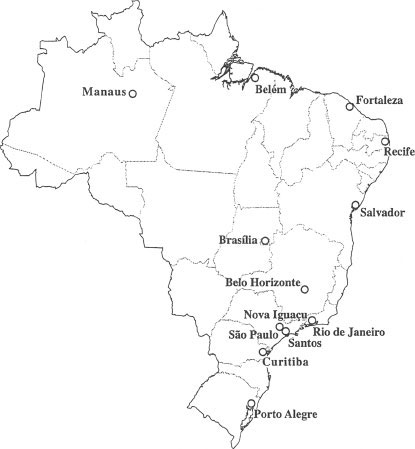
BRAZILIAN
LEGACIES
Brazil, the largest and most populous country in Latin America, has long fascinated outsiders, although often for inaccurate reasons. Until recently, foreigners often saw Brazil as a land of coffee and parrots, Carnival and the Amazon, the samba-land of Hollywoods 1930s Flying Down to Rio. Waldo Frank, a well-meaning writer who traveled through South America in 1942, maintained that Brazil was a nation of archetypal forest-dwellers, since 85 percent of Brazils people had African blood, and out of the Brazilian forest a new world culture was emerging.
The real Brazil is far different, of course, although to be sure it has produced an original and vibrant culture of its own. It is a manufacturing giant; food production is dominated by large agro-industrial businesses; and it boasts one of the most sophisticated cultural environments in the world. Brazil is a country of not only rain forests but concrete jungles teeming with energy and choked with traffic, as well as population blends of rich and poor, immigrant and migrant, old and young.
Its diverse population includes more persons of African descent than any country except Nigeria, and more Japanese than anywhere outside of Japan. More descendants of Arab peoples live in Brazil than anywhere outside the Middle East. Large numbers of Brazilians have ancestors from places as disparate as Italy, Jamaica, Poland, Germany, Switzerland, Korea, and the Confederate States of America. The largest Roman Catholic nation on earth, Brazil is also home to millions of evangelical Protestants as well as Buddhists, Muslims, Mormons, European spiritists, Sephardic and Ashkenazic Jews, and followers of a pantheon of animist religions brought to Brazil on the slave ships from Africa but still very much alive today.
Its successes range from its relaxed racial ambience to the quiet professionalism of its international diplomats. Brazils exuberant soccer team won the worlds imagination as it marched in 1994 to the tetra, the unprecedented fourth-time capture of the World Cup. Brazil has become known for its exports of its music, orange juice, shoes, and textiles, although fewer know that Brazil has also become a world leader in the sale of soybeans, passenger airplanes, minerals, and armaments. When frosts damaged Brazilian coffee plantations in 1994, world prices rose immediately. Outsiders also now know about the plight of Brazils native peoples and abandoned street children. News about angry urban violence halved the annual number of international tourists to Rio de Janeiro since 1989 from 400,000 to 200,000, although tourism has picked up in other parts of the country, especially to the beautiful beaches of the northeastern coast.
Brazilians have reversed their former isolation. Mercosul, the Southern Cones Common Market, has opened borders and spurred tourism, stimulating commerce as well. More than ever, Brazilians have become world travelers. An estimated 60,000 Brazilians visit Orlando each year; thousands more go to Western Europe, the Middle East, the rest of the United States, and Asia. Brazil exports not only soccer stars but musicians, dance groups, automobile racers, and soap operas; it also sends abroad university-educated men and womenobtaining entry into foreign countries by any means at their disposalseeking to accumulate enough capital to return home with an economic stake for their families. There are Brazilian colonies in Tokyo, Riyadh, Los Angeles, Middleton (Wisconsin), Miami, Toronto, Paris, and scores of cities elsewhere. Brazil has forged two-way links with the world.
Brazilian Legacies is an interpretive essay that explains the historical reasons for the countrys present-day condition. Given that Brazil is a vast country whose regions are as different from one another as far-flung regions in Russia, Canada, and the pre-interstate-highway United States, some of the discussion about Brazilian culture or Brazilian life may not apply universally. As a national entity, however, Brazil dominates its subcontinent, extending to the borders of nine Latin American neighbors. As such, common themes that make Brazil what it is today merit analysis.
Next pageFont size:
Interval:
Bookmark:
Similar books «Brazilian Legacies»
Look at similar books to Brazilian Legacies. We have selected literature similar in name and meaning in the hope of providing readers with more options to find new, interesting, not yet read works.
Discussion, reviews of the book Brazilian Legacies and just readers' own opinions. Leave your comments, write what you think about the work, its meaning or the main characters. Specify what exactly you liked and what you didn't like, and why you think so.

